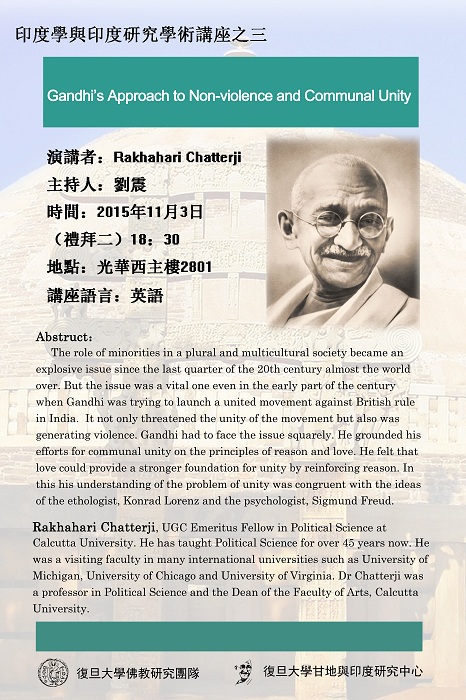
Gandhi’s Approach to Non-violence and Communal Unity
时间:11月3日(礼拜二)18:30
地点:光华楼西主楼2801报告厅
主讲人:Rakhahari Chatterji
主持人:刘 震 研究员
主讲人简介:
Rakhahari Chatterji was UGC Emeritus Fellow in Political Science at Calcutta University. He has taught Political Science for over 45 years now. He was a visiting faculty in many international universities such as University of Michigan, University of Chicago and University of Virginia. Dr Chatterji was a professor in Political Science and the Dean of the Faculty of Arts, Calcutta University.
He has written and edited around 10 books and over 80 papers, published in various national and international journals and newspapers. His most recent published works are Tulanatmak Rajniti Parichaya (Bengali version of Comparative Political Analysis, 2011), Introduction to Comparative Political Analysis (2010) and Comparative Politics: History, Methods and Approaches (2003). He has also edited Politics India: The State-Society Interface (2009).
报告简介:
The role of minorities in a plural and multicultural society became an explosive issue since the last quarter of the 20th century almost the world over. But the issue was a vital one even in the early part of the century when Gandhi was trying to launch a united movement against British rule in India. It not only threatened the unity of the movement but also was generating violence. Gandhi had to face the issue squarely. He grounded his efforts for communal unity on the principles of reason and love. He felt that love could provide a stronger foundation for unity by reinforcing reason. In this his understanding of the problem of unity was congruent with the ideas of the ethologist, Konrad Lorenz and the psychologist, Sigmund Freud.